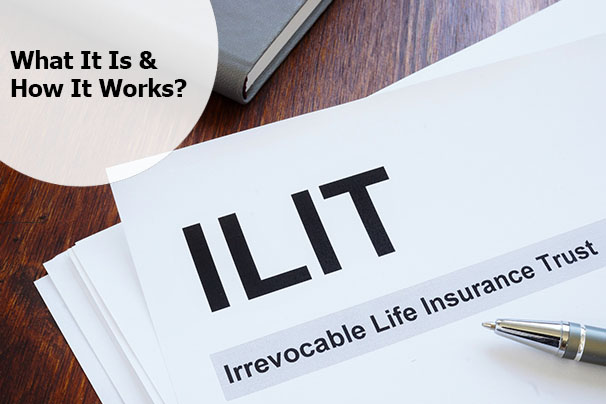Establishing an irrevocable life insurance trust (ILIT) brings a sense of assurance from the very beginning of your real estate planning.

This specialized trust not only provides command over a life insurance policy but also serves as a strategic financial tool. The ILIT is essentially funded by a life insurance policy.
However, beyond the security, it offers, it becomes a valuable instrument for managing real estate taxes and crafting a lasting legacy.
It empowers you to steer the destiny of your life insurance policy, dictating how your beneficiaries will receive the death benefits upon your passing.
Recognizing that a life insurance policy is both an asset and an investment, it’s crucial to acknowledge that, upon your demise, it becomes part of your estate. What’s more? Read on to be enlightened.
What is an Irrevocable Life Insurance Trust?
An irrevocable life insurance trust is a financial tool that helps you handle your life insurance plans and give out the benefits when you pass them on.
It’s a trust made by the person who owns and controls the life insurance policies during their lifetime.
This trust takes care of managing and giving the money to the people you want to have, following your instructions.
A big advantage is that it also shields the benefits of the life insurance policy from estate taxes. One thing about this trust is that once it’s set up, it can’t be changed.
How Does an Irrevocable Life Insurance Trust Work?
A person establishes this insurance trust to independently oversee life insurance, distinct from their estate. This means the life insurance value will not be part of the estate.
In this trust, the policy is owned by the trust itself, not the person who originally owned it.
However, since the trust owns the life insurance, the person who set it up (the grantor) usually gives money to the trust. The trustee then uses this money to pay the life insurance premiums.
The grantor funds the trust by using the gift tax exemption they are eligible for each year. The trustee can convert these gifts and use them to cover the life insurance premiums.
This arrangement brings estate planning benefits for both the grantor and the beneficiaries. Moreover, the benefits are shielded from creditors and legal judgments.
When the grantor passes away, the trustee receives the life insurance payout and then distributes it to the beneficiaries.
Benefits of an Irrevocable Life Insurance Trust
Keeping the life insurance proceeds out of the insured person’s estate to avoid estate taxes is the primary advantage of an irrevocable life insurance trust.
Beyond this key benefit, other advantages of an irrevocable life insurance trust include:
Avoiding Generation-Skipping Transfer Tax
When the insured person is also the owner of the life insurance contract, the death benefits may be considered part of their estate.
This insurance trust can exclude these benefits from the estate, helping to avoid generation-skipping transfer tax.
Asset Protection from Creditors
Safeguarding the assets within the trust from the creditors of both the grantor and beneficiaries.
Tailored Distributions for Beneficiaries
Creating a distribution plan suitable for the beneficiary pool to prevent potential mismanagement of funds.
Preserving Government Benefit Eligibility
Keeping trust assets separate from the beneficiary’s estate ensures eligibility for government benefits, such as Medicaid or Social Security disability income, without jeopardizing the benefits.
Controlled Distributions by Trustee
Allowing the trustee to manage and control how distributions are utilized.
Providing Income to Spouses
Including the life insurance policy in a trust allows the death benefit to provide income to a spouse without increasing their estate.
Maximizing Control Over Proceeds
Using a trust allows you to provide specific instructions on how the life insurance benefits should be utilized.
Cash For Estate Taxes
Funding an irrevocable life insurance trust ensures that your estate can cover state or federal wealth transfer taxes without the need to liquidate assets like business holdings or real estate.
These are some of the benefits of an irrevocable life insurance trust.
Why Use An Irrevocable Life Insurance Trust?
An irrevocable trust is mostly used to keep assets aside for a specific purpose. This includes paying estate taxes because the assets are not taxable.
To do this, the assets must be included in the life insurance trust for at least three years before being used.
However, most people create new policies in the name of their spouse to meet the requirements. If they are properly structured, the death benefits that are paid to the insurance trust will be free from any estate tax.
What Is The Aim Of A Life Insurance Trust?
The purpose of a life insurance trust is to lower the worth of an individual estate to reduce the estate tax that is paid on the life insurance benefits that are passed from the grantor to the beneficiary. Trusts also protect the assets from creditors.
How To Set Up A Trust
An irrevocable life insurance trust is an excellent option if you are searching for good asset protection and want to have more control over what happens to your life insurance benefits.
Setting up an ILIT is not easy, and it requires complicated legal entities to set up. You need to work with an experienced financial advisor and lawyer to properly set it up.
Is It Possible To Dissolve An Irrevocable Life Insurance Trust?
No. It is not possible to dissolve this insurance trust. But a court might be able to dissolve it under certain conditions.
Can I Withdraw From An Irrevocable Life Insurance Trust?
An irrevocable trust might include provisions known as Crummey powers, which enable the beneficiaries to get withdrawal rights for a specific period after the contributions are made.


